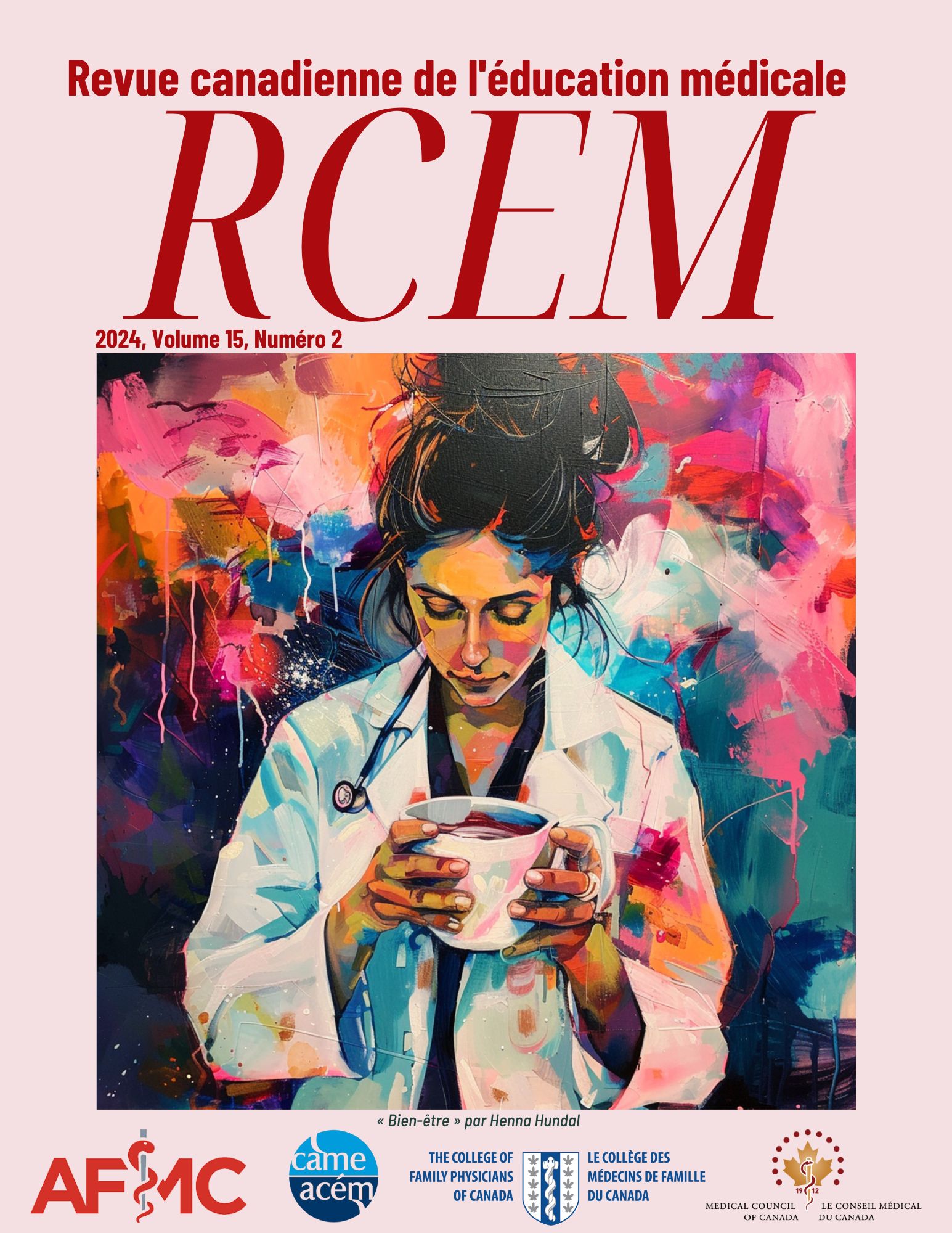Comprendre le point de vue des co-éducateurs communautaires sur l'apprentissage par le service communautaire : une analyse qualitative
DOI :
https://doi.org/10.36834/cmej.76453Résumé
Contexte : L'apprentissage par le service communautaire (APSC) est une composante essentielle du système d'éducation médicale canadien. Cependant, le rôle unique des organismes communautaires partenaires (OCP) dans le soutien de l'APSC n'est toujours pas clair. Cette étude qualitative évalue le point de vue des OCP en tant que co-éducateurs dans le programme d'études médicales de premier cycle.
Méthodes : Nous avons mené huit entrevues individuelles semi-structurées avec des OCP d'une faculté de médecine de Toronto, en Ontario, entre 2020 et 2021. Les entrevues ont été menées en suivant un guide d'entrevue prédéterminé, puis enregistrées, dépersonnalisées et transcrites. Trois examinateurs ont effectué indépendamment une analyse thématique inductive des codes, suivie d'un examen collectif des divergences.
Résultats : Cinq conclusions principales ont été identifiées : 1) les OCP ont un intérêt commun à agir en tant que co-éducateurs; 2) il existe une grande hétérogénéité dans la compréhension de la co-éducation; 3) il est possible d'accroître les partenariats entre les OCP et le corps professoral; 4) le rôle des co-éducateurs est limité par la structure du curriculum médical et 5) les co-éducateurs facilitent des opportunités d’apprentissage uniques sur les déterminants sociaux de la santé qui ne sont pas disponibles dans le cadre de l'enseignement didactique traditionnel.
Conclusions : Les co-éducateurs communautaires jouent un rôle novateur et unique dans le programme d'études médicales de premier cycle, soutenu par l'intérêt des OCP. L'accent mis sur ce rôle peut contribuer à former de futures cohortes d'étudiants en médecine capables de comprendre et de répondre aux besoins des populations qu'ils servent.
Références
Hays R. Community-oriented medical education. Teaching Teacher Educ. 2007;23(3):286-93. https://doi.org/10.1016/j.tate.2006.12.018. DOI: https://doi.org/10.1016/j.tate.2006.12.018
Doobay-Persaud A, Adler MD, Bartell TR, et al. Teaching the social determinants of health in undergraduate medical education: a scoping review. J Gen Intern Med. 2019;34:720-30. https://doi.org/10.1007/s11606-019-04876-0. DOI: https://doi.org/10.1007/s11606-019-04876-0
Strasser R, Worley P, Cristobal F, et al. Putting communities in the driver’s seat: the realities of community-engaged medical education. Acad Med. 2015;90(11):1466-70. https://doi.org/10.1097/ACM.0000000000000765. DOI: https://doi.org/10.1097/ACM.0000000000000765
Mennin S, Petroni‐Mennin R. Community‐based medical education. Clin Teach. 2006;3(2):90-6. https://doi.org/10.1111/j.1743-498X.2006.00093.x. DOI: https://doi.org/10.1111/j.1743-498X.2006.00093.x
Hunt JB, Bonham C, Jones L. Understanding the goals of service learning and community-based medical education: a systematic review. Acad Med. 2011;86(2):246-51. https://doi.org/10.1097/ACM.0b013e3182046481. DOI: https://doi.org/10.1097/ACM.0b013e3182046481
Irby DM, Wilkerson L. Educational innovations in academic medicine and environmental trends. J Gen Intern Med. 2003;18(5):370-6. https://doi.org/10.1046/j.1525-1497.2003.21049.x. DOI: https://doi.org/10.1046/j.1525-1497.2003.21049.x
Quinn SC, Gamble D, Denham A. Ethics and community-based education: Balancing respect for the community with professional preparation. Fam Commun Health. 2001:9-23. http://www.jstor.org/stable/44953949. DOI: https://doi.org/10.1097/00003727-200101000-00004
Stearns JA, Stearns MA, Glasser M, Londo RA. Illinois RMED: a comprehensive program to improve the supply of rural family physicians. Fam Med. 2000;32(1):17-21. PMID: 10645509.
Sakai DH, Fukuda MH, Nip IL, Kasuya RT. School health education at the Queen Emma Clinics: a service-learning project at the John A. Burns School of Medicine. Hawaii Med J. 2002;61(1). PMID: 11868198
Kaufman A, Galbraith P, Alfero C, et al. Fostering the health of communities: a unifying mission for the University of New Mexico Health Sciences Center. Acad Med. 1996;71(5):432-40. http://doi.org/10.1097/00001888-199605000-00010. DOI: https://doi.org/10.1097/00001888-199605000-00010
Averill NJ, Sallee JM, Robinson JT, et al. A first-year community-based service learning elective: design, implementation, and reflection. Teach Learn Med. 2007;19(1):47-54. http://doi.org/10.1080/10401330709336623. DOI: https://doi.org/10.1080/10401330709336623
Ferrari JR, Worral L. Assessments by community agencies: how "the other side" sees service-learning. Michigan J Commun Serv Learn. 2000;7(1):35-40.
Blouin DD, Perry EM. Whom does service learning really serve? Community-based organizations' perspectives on service learning. Teach Sociol. 2009;37(2):120-135. https://doi.org/10.1177/0092055X0903700201. DOI: https://doi.org/10.1177/0092055X0903700201
Hammersley L. Community-based service-learning: partnerships of reciprocal exchange? APJCE. 2012;14(3):171-184.
Cresswell JW. Qualitative inquiry and research design: choosing among five traditions. In: Thousand Oaks, CA: Sage; 1998.
JM. Designing qualitative research. In: Denzin NK, Lincoln YS, editors. Handbook of qualitative inquiry. Thousand Oaks, CA: Sage; 1994.
Walker A, Mercer J, Freeman L. The doors of opportunity: How do community partners experience working as co-educators in a service-learning collaboration? J University Teach Learn Pract. 2021;18(7):56-70. https://doi.org/10.53761/1.18.7.5
Miron D, Moely BE. Community agency voice and benefit in service-learning Michigan J Commun Serv Learn. 2006;12(2):27-37.
Stewart T, Alrutz M. Meaningful relationships: Cruxes of university-community partnerships for sustainable and happy engagement. J Com Engage Schol. 2012;5(1):44-55. http://doi.org/10.54656/NYHZ8317. DOI: https://doi.org/10.54656/NYHZ8317
Stewart T, Wubbena Z. An overview of infusing service-learning in medical education. Internat J Med Educ. 2014;5:147. http://doi.org/10.5116/ijme.53ae.c907. DOI: https://doi.org/10.5116/ijme.53ae.c907
Berrington R, Condo N, Rubayita F, Cook K, Jalloh C. Community organization feedback about an undergraduate medical education service learning program. Can Med Ed J. 2021;12(4):70-8. https://doi.org/10.36834/cmej.71420. DOI: https://doi.org/10.36834/cmej.71420
Téléchargements
Publié
Numéro
Rubrique
Licence
© Grace Zhou, Aarabi Thayaparan, Stephanie Park, Yasamin Sadeghi, Brandi Deimling, Roxanne Wright, Fok-Han Leung 2023

Cette œuvre est sous licence Creative Commons Attribution - Pas d'Utilisation Commerciale - Pas de Modification 4.0 International.
La soumission d’un manuscrit original à la revue constitue une indication qu’il s’agit d’un travail original, qu’il n’a jamais été publié et qu’il n’est pas envisagé pour publication dans une autre revue. S’il est accepté, il sera publié en ligne et ne pourra l’être ailleurs sous la même forme, à des fins commerciales, dans quelque langue que ce soit, sans l’accord de l’éditeur.
La publication d’une recherche scientifique a pour but la diffusion de connaissances et, sous un régime sans but lucratif, ne profite financièrement ni à l’éditeur ni à l’auteur.
Les auteurs qui publient dans la Revue canadienne d’éducation médicale acceptent de publier leurs articles sous la licence Creative Commons Paternité - Pas d’utilisation commerciale, Pas de modification 4.0 Canada. Cette licence permet à quiconque de télécharger et de partager l’article à des fins non commerciales, à condition d’en attribuer le crédit aux auteurs. Pour plus de détails sur les droits que les auteurs accordent aux utilisateurs de leur travail, veuillez consulter le résumé de la licence et la licence complète.











